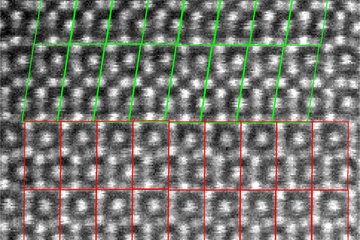All genres
521.
Talk
Stacking fault energies of CrMnFeCoNi-based high entropy alloys from ab initio. Materials Science and Engineering 2018 (MSE) , Darmstadt, Germany (2018)
522.
Talk
Segregation and Transformation at Lattice Defects as Microstructure Design Toolbox. Materials Science and Engineering Congress, Darmstadt, Germany (2018)
523.
Talk
Fundamental compositional limitations in the thin film growth of metastable alloys. 3rd Conference on Advanced Functional Materials (AFM2018), Vildmarkshotellet Kolmården, Norrköping, Sweden (2018)
524.
Talk
Modelling thermodynamics and kinetics of general grain boundaries: Challenges and successes. Thermec 2018 Conference, Paris, France (2018)
525.
Talk
First-principles approaches for charged defects in low dimensional systems. Conference on Physics of Defects in Solids, Trieste, Italy (2018)
526.
Talk
Understanding fundamental doping and stoichiometry limits in semiconductors by ab initio modelling. EDS 2018 Conference, Thessaloniki, Greece (2018)
527.
Talk
Efficient approach to compute melting properties fully from ab initio with application to Cu. CALPHAD XLVII Conference, Querétaro, México (2018)
528.
Talk
Machine learning as tool to enhance ab initio based alloy design. Workshop: “Machine learning and data analytics in advanced metals processing", Manchester, UK (2018)
529.
Talk
From electrons to the design of structurally complex materials. SFB ViCoM conference EPT 2018: From electrons to phase transitions, Vienna, Austria (2018)
530.
Talk
Exploration of Large Ab Initio Data Spaces to Design Structural Materials with Superior Mechanical Properties. Hume-Rothery Award Symposium, TMS 2018, Phoenix, AZ, USA (2018)
531.
Talk
Phonon broadening in high entropy alloys. TMS 2018, Phoenix, AZ, USA (2018)
532.
Talk
Energetics of non-stoichiometric stacking faults in Fe–Nb alloys: An ab initio study. DPG-Frühjahrstagung 2018, Berlin, Germany (2018)
533.
Talk
Understanding the fundamental mechanisms behind H embrittlement: An ab initio guided multiscale approach. Seminar E2M ("Wall Forum") at MPI for Plasma Physics, Garching, Germany (2018)
534.
Talk
A first principles approach to model electrochemical reactions in an electrolytic cell. Workshop: The Electrode Potential in Electrochemistry - A Challenge for Electronic Structure Theory Calculations, Schloß Reisensburg, Günzburg, Germany (2017)
535.
Talk
Temperature-driven effects in functional materials: Ab initio insights. Talk at University Pierre and Marie CURIE (UPMC), Paris, France (2017)
536.
Talk
Free energy sampling strategies for structurally complex materials. Workshop II: Stochastic Sampling and Accelerated Time Dynamics on Multidimensional Surfaces, IPAM, UCLA, Los Angeles, CA, USA (2017)
537.
Talk
Materials Discovery and Design at Finite Temperatures. MS&T 2017, Pittsburgh, PA, USA (2017)
538.
Talk
Materials Discovery and Design on Grain Boundary Migration. MS&T, Pittsburgh, PN, USA (2017)
539.
Talk
Theory-guided Design of Novel Fe–Al-based Superalloys. Intermetallics 2017, Educational Center Kloster Banz, Bad Staffelstein, Germany (2017)
540.
Talk
Impact of Magnetism on the Stability of Topologically Close-packed (TCP) Phases in Fe–Nb Alloys. Intermetallics 2017, Educational Center Kloster Banz, Bad Staffelstein, Germany (2017)











